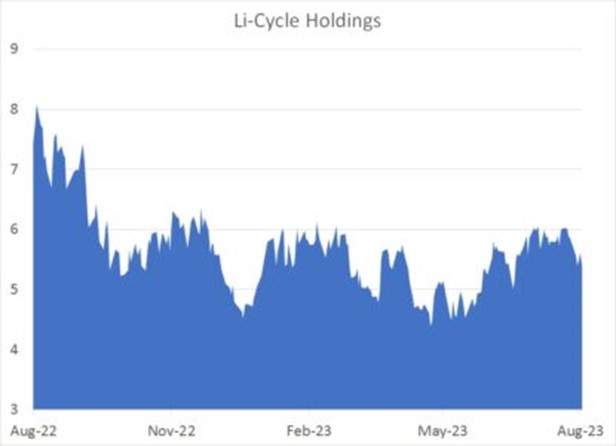Li-Cycle (LICY) is a Canada-based battery-recycling specialist. It recycles lithium-ion batteries. That is a big deal because of lithium batteries’ vital role in electric vehicles (EVs) and renewable energies storage, burgeoning markets with expected decades of strong growth ahead, writes Scott Chan, editor of The Complete Investor.
Like other batteries, lithium-ion batteries don’t have infinite life. For example, a typical EV battery is expected to last about 15 years, but actual lifespan can vary significantly depending on multiple factors. Once an EV battery can no longer power the vehicle over long distances, it can still be used for other energy storage purposes, such as being part of an energy storage system.
But eventually, the battery life has an end. At that point, for environmental and cost reasons, it makes sense to recycle as much of the battery as possible. After all, if they ended up in landfills, that undermines their green profile. This is where Li-Cycle comes in.
Before an EV battery can be recycled, it has to be dismantled, shredded, and separated into a mixture of valuable metallic powder and other metals and plastics. The valuable mixture, due to the usually high concentration of black-colored graphite, is called “black mass,” consisting of the most valuable parts of the battery, the anode and cathode. The mixture is then processed into battery-grade materials for resale.
The recycled materials are essentially as good as the freshly mined compounds—lithium, nickel, and cobalt are theoretically infinitely recyclable. Research shows that lithium-ion batteries made with cathodes that use recycled material perform just as well as, or even better than, those made with pristine materials. Thus, once recycled, the metals can be fed back into the supply chain, creating a closed loop that’s environmentally friendly and also saves on costs because it increases supply.
Li-Cycle operates in both vital steps of the recycling process described above. Using its proprietary Spoke & Hub technology (a hydrometallurgical process), the company says that it is capable of recovering up to 95% of key materials in lithium-ion batteries, such as lithium, nickel, and cobalt. According to the company, the industry average recovery rate is only about 50%.

While the EV market has been around for a while, EV battery recycling is still nascent. Li-Cycle is one of a handful of publicly traded battery recycling companies. It is the leader in North America in terms of installed recycling capacity. By the end of 2023, the company expects to have 81,000 metric tons of total battery processing capacity across its five Spoke facilities (four in North America and one in Germany), which break down batteries into black mass and other metals and plastics.
Li-Cycle has only had one profitable quarter since its 2020 IPO. A major reason is the high capital spending to build the necessary infrastructure to grow. The company will need a major catalyst or two to shift into extra gear. We are betting that it will happen.
Recommended Action: Buy LICY










